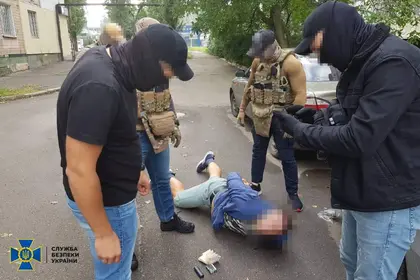The Security Service of Ukraine (SBU) carried out a special operation in the Mykolaiv region, resulting in the discovery of one of the most significant intelligence networks operated by Russia since the beginning of the full-scale invasion in February 2022.
The network comprised 13 local residents working for Russia’s Federal Security Service (FSB), according to an SBU press release on Tuesday, Oct. 3.
JOIN US ON TELEGRAM
Follow our coverage of the war on the @Kyivpost_official.
The individuals collected intelligence regarding the positions and movements of Ukraine’s Defense Forces around the southern Mykolaiv region. Subsequently, they provided the Russian Federation with targeting information.
The report noted: “It was based on their coordinates that the Russian occupiers targeted a high-rise building in Mykolaiv with an S-300 anti-aircraft missile system in the autumn of 2022,” resulting in the tragic loss of seven civilians, including a child.
According to the SBU, these Russian informants relayed the coordinates of the targets to Russia’s FSB through an intermediary, identified as the pro-Kremlin blogger Serhiy Lebedev, better known by his pseudonym “Lokhmaty” (Shaggy).
Lebedev, operating as a “freelance correspondent” for the Moscow news agency RIA-Novosti, is currently in hiding in temporarily occupied Donetsk. The SBU previously exposed him for involvement in intelligence and subversive activities against Ukraine, resulting in charges of treason earlier this year in June.

Eurotopics: Russian General Killed - What to Make of It?
Under the direction of the FSB, “Lokhmaty” established his own agency within the Mykolaiv region, consisting of 13 local subscribers to his Telegram channel, according to the SBU. Using this platform, he recruited agents and received intelligence from them.
SBU personnel successfully identified all members of Lebedev’s Russian agency and apprehended them at various locations.
Based on the evidence gathered, SBU investigators formally issued notices of suspicion to nine detainees accused of “unauthorized dissemination of information related to the transfer, movement, and placement of weapons, armaments, and military supplies to Ukraine.” The suspects are currently in custody.
The court had judged four other members of this network guilty of crimes committed and sentenced them to prison terms ranging from 8 to 15 years.
Lebedev faces the additional charge of treason, committed as part of an organized group during martial law.
In recent weeks, the SBU has made several high-profile arrests, including two suspects accused of having provided targeting information to Moscow’s forces, which resulted in the Sept. 21 attack on Kyiv.
At that time, President Volodymyr Zelensky underscored that this served as “a clear warning to all traitors: retribution awaits.”
In a comment to Kyiv Post, the SBU’s press service emphasized that their primary objective is to “operate in a manner that aims to uncover spies at the preparation stage of their crimes, preventing them from carrying out their assigned tasks.”
The SBU employs a variety of methods for collecting and analyzing information, “ranging from monitoring open sources and utilizing our own operational sources to obtaining testimony from previously exposed spies,” the press service told Kyiv Post.
The SBU explained that Russian agents have the capacity to operate anywhere within the territory of Ukraine. However, the most significant activity of artillery spotters is typically observed in frontline and border regions.
“The fighting units of the Defense Forces of Ukraine are concentrated there. And Russian informants are ‘hunting’ for their coordinates,” the SBU said.
Kyiv Post also sought insights regarding the motives of those who collaborate with the Russians. But the special SBU representatives stressed that crafting a generalized “portrait” of collaborators can be challenging, as they can be individuals of varying age and social status. Nevertheless, when it comes to motives, there are fewer variations.
“Russian special services primarily target two categories of individuals for their purposes: those who support the ‘Russian world’ and work for financial gain or the promise of positions within occupation administrations, and individuals who can be coerced through blackmail and threats,” the SBU noted.
Since the start of the conflict, the SBU has formally issued notices of suspicion to nearly 250 individuals for their involvement in helping the enemy target objectives. In the current year, 114 notices of suspicion have been issued.
The SBU specified that a total of 213 individuals have received guilty verdicts, with 69 suspects being convicted. However, these statistics pertain to only one article of the Ukrainian Criminal Code, specifically the unauthorized dissemination of information about the Armed Forces.
You can also highlight the text and press Ctrl + Enter






